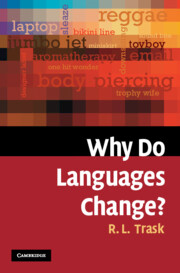Book contents
- Frontmatter
- Contents
- List of figures and tables
- A few words before we start
- Acknowledgements
- 1 How do languages change?
- 2 Why are languages always changing?
- 3 Where do words come from?
- 4 Skunk-Leek – my kind of town: what's in a name?
- 5 Where does English come from?
- 6 Why is American English different from British English?
- 7 Why is English spelling so eccentric?
- 8 Which is the oldest language?
- Some final thoughts
- Further reading
- Index
7 - Why is English spelling so eccentric?
Published online by Cambridge University Press: 05 June 2012
- Frontmatter
- Contents
- List of figures and tables
- A few words before we start
- Acknowledgements
- 1 How do languages change?
- 2 Why are languages always changing?
- 3 Where do words come from?
- 4 Skunk-Leek – my kind of town: what's in a name?
- 5 Where does English come from?
- 6 Why is American English different from British English?
- 7 Why is English spelling so eccentric?
- 8 Which is the oldest language?
- Some final thoughts
- Further reading
- Index
Summary
The mess that is English spelling
English has probably the most eccentric, irregular and infuriating spelling system in the world. While other languages, like Spanish, Italian and Finnish, have largely regular spelling systems with only a few exceptions here and there, English spelling is so densely buried in exceptions that the regularities can be hard to find.
On the one hand, a single sound gets multiple spellings. For example, all of the following words are perfect rhymes for most speakers of English (though not for Scots): herd, bird, word, curd, heard, inferred, stirred, purred. One rhyme, at least eight spellings. On the other hand, a single spelling often represents several different sounds: through, dough, bough, cough and rough look as if they should all rhyme, but in fact no two of them do.
So messy is English spelling that it becomes an entertaining exercise to find all the ways of spelling any single sound. Take the sound /ai/, as in the word eye. In how many different ways do we spell this sound in English? Here's a list, not guaranteed to be complete. Four or five of these are ‘regular’ spellings, found in a large number of words, while others are idiosyncratic spellings confined to a handful of words or even to a single word.
This is already thirteen different spellings for one sound, with very little in the way of rules for choosing one spelling or another (note by, bye and buy, for example, not to mention the colloquial bi, meaning ‘bisexual’).
- Type
- Chapter
- Information
- Why Do Languages Change? , pp. 130 - 153Publisher: Cambridge University PressPrint publication year: 2009



